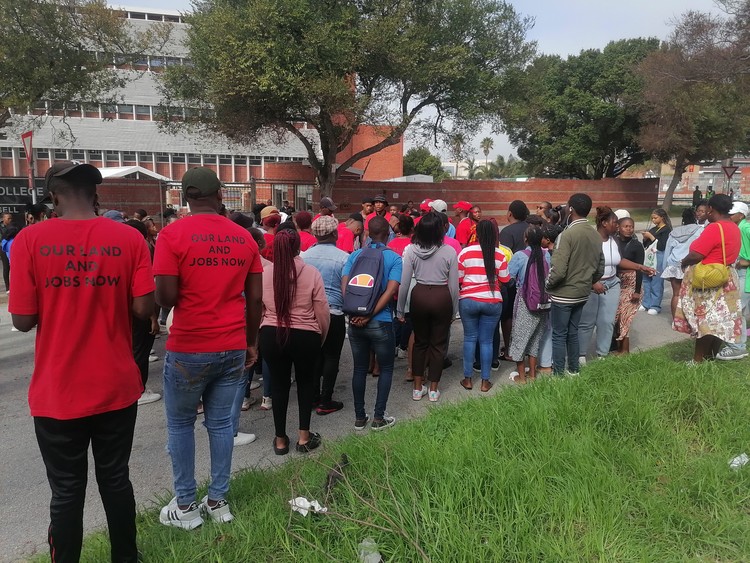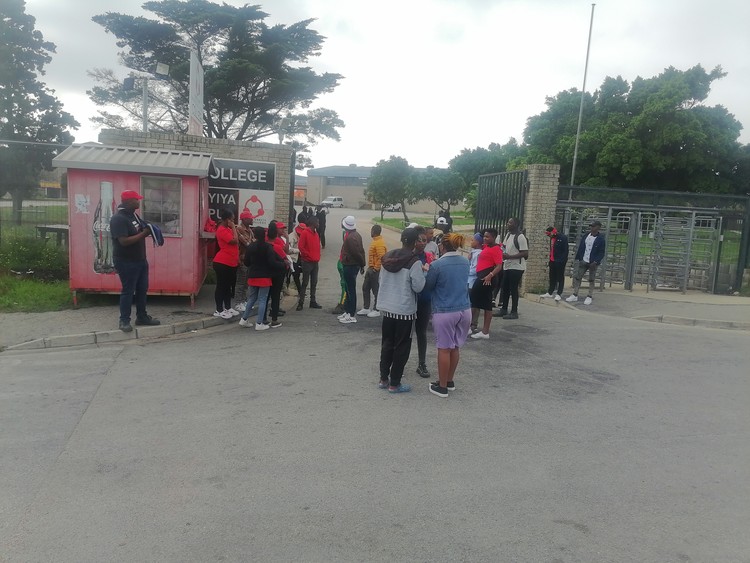No lectures for nearly two months now at Gqeberha college
Students have been protesting at Port Elizabeth TVET College over unpaid NSFAS allowances
About 100 students picket outside the PE TVET College Russell campus on Thursday. They have been picketing since March because of unpaid NSFAS allowances. Photos: Joseph Chirume
- For nearly two months no lectures have been given at the Port Elizabeth TVET College in Gqeberha.
- Students have been protesting since March over unpaid NSFAS allowances, among other management issues at the college.
- A lecturer at the college complained that the shutdown would put pressure on them to finish a full year’s syllabus in the remaining months of this year.
The situation outside the Port Elizabeth TVET College in Gqeberha remained tense on Wednesday. Lectures and other academic activities at most of its campuses have been suspended since March because of ongoing protests by students over unpaid National Student Financial Aid Scheme’s (NSFAS) allowances, among other management issues.
While the college is yet to respond to GroundUp’s repeated requests for comment, we were informed that the college has since hired a private security company to safeguard its campuses until it is deemed safe for staff to return.
Deputy Principal Dorian Baartzes told GroundUp that college management and officials from the Department of Higher Education and Training had met on 12 April to discuss the forced shut down.
He said they had agreed that the NSFAS office at the college was understaffed and that their requests for more staff to deal with an influx of student complaints “fell on deaf ears”.
Last week, students also protested outside the Russell Road campus.
Sangolinye Ngqungwana, a lecturer at the college and shop steward for the National Union of Public Service and Allied Workers (NUPSAW), said, “The situation is bad and affects us as staff, because we have not been teaching for a long time. The pressure will come back to us to finish the syllabus when the shutdown is over. We will be compelled to finish a syllabus in the few months left of the year.”
Sisipho Mamazana, an N2 engineering student at Iqhayiya campus, said every day the shutdown continues, she loses hope of completing her studies and getting her family out of poverty.
Once qualified, she hopes to support her single mother and three younger siblings who still live in rural Qumbu. Mamazana, along with dozens of other students, have had to look for part-time jobs to pay for their housing, food and transport because NSFAS has not yet paid their allowances.
Mamazana said she might be evicted by her landlord if she doesn’t pay rent soon.
“It’s extremely stressful for me. The last time I received payment [from NSFAS] was at the end of 2022. I’m about to be kicked out by my landlord where I need to pay R1,500 per month for rent,” she said.
Student leaders block the entrance to the Iqhayiya campus on Wednesday morning.
Another student who asked not to be named, questioned whether the college had done proper checks on the accredited residences they were allocated.
“Three students share a very small room which does not have air conditioning and is not ideal for studying. We are also made to pay for electricity. The water is dirty and smells bad so we have no choice but to buy bottled water,” said the student.
Student representative Siyabulela Stuurman said they initially raised their concerns with management on 16 February but to no avail.
“After that we protested and held a meeting of all stakeholders. The college promised to fix our demands. But after weeks we discovered that nothing was being done; that’s when we decided to close all gates,” he said.
Among the students’ demands are the appointment of a principal, the immediate end to the sick leave of several senior managers, old buildings on campus to be refurbished, and shuttle transport to and from campuses for those living at accredited residences.
Support independent journalism
Donate using Payfast

Don't miss out on the latest news
We respect your privacy, and promise we won't spam you.
Next: Hollywood star joins yoga classes for Lavender Hill learners
Previous: Judge rules for “road” in legal clash with “toads”
© 2024 GroundUp. This article is licensed under a Creative Commons Attribution-NoDerivatives 4.0 International License.
You may republish this article, so long as you credit the authors and GroundUp, and do not change the text. Please include a link back to the original article.
We put an invisible pixel in the article so that we can count traffic to republishers. All analytics tools are solely on our servers. We do not give our logs to any third party. Logs are deleted after two weeks. We do not use any IP address identifying information except to count regional traffic. We are solely interested in counting hits, not tracking users. If you republish, please do not delete the invisible pixel.


